Movie Review – La Dolce Vita
It takes a while to get going, but eventually Fellini’s film gets to you. The juxtaposition of a new, modern sensuality (in post-war Italy) against the landscape of historical Rome, eventually sizzles, with Anita Ekberg’s vibrant sexuality almost Marilyn Monroe-esque in luminosity. La Dolce Vita isn’t the classic I’d expected, but as one of the most important works of Fellini’s career, it’s certainly enthusiastic, charming, and intelligent – if not always enlightening.
– Summary –
Director : Federico Fellini
Year Of Release : 1960
Principal Cast : Marcello Mastroianni, Anita Ekberg, Anouk Aimee, Yvonne Furneaux, Magali Noel, Alain Cuny, Lex Barker, Nadia Gray.
Major Award Wins : Academy Awards: Best Costume Design (Black and White)
Approx Running Time : 174 Minutes
Synopsis: A womanizing Italian journalist romances a visiting Swedish actress, as well as a local socialite, dreaming of a life more meaningful that the rootless one he has.
What we think : It takes a while to get going, but eventually Fellini’s film gets to you. The juxtaposition of a new, modern sensuality (in post-war Italy) against the landscape of historical Rome, eventually sizzles, with Anita Ekberg’s vibrant sexuality almost Marilyn Monroe-esque in luminosity. La Dolce Vita isn’t the classic I’d expected, but as one of the most important works of Fellini’s career, it’s certainly enthusiastic, charming, and baffling – if not always enlightening.
**********************
This film is part of the Cinematic Katzenjammer’s Not-So-Secret-Santa Blogathon. More reviews in this series can be found here.
Ahhh, the good life.
Philosophers would wax lyrical in saying that film is a journey of discovery – from opening frame to close, the stories told by film-makers down the years have always taken us to places we quite often would never go (and can never go) ourselves. Not only are films individual journeys, so to film blogging, a pursuit which can take a weaving, wildly eventful path each time a studio logo comes up on screen. Often, as bloggers, we tend to stay with the safe options, but on the odd occasion, we’ll step outside to experience a film we would normally either avoid or simply miss, for whatever reason. For me, the foreign film landscape is one I’ve never had the time (or the inclination, until recently) to fully explore like I probably should. The films of Federico Fellini, the great Italian master, are (and I’m ashamed to admit it) a cinema journey I’ve never taken – I’m a Fellini virgin. A blogathon challenge, such as the CK’s Not-So-Secret-Santa version, is exactly the kind of thing I need to get myself out of the doldrums with regards to alternative film viewing. Now, I’ve heard great things about Fellini, and about this film in particular, so I approached it with a great deal of anticipation; did it live up to my expectations? That’s what you’re about to find out!
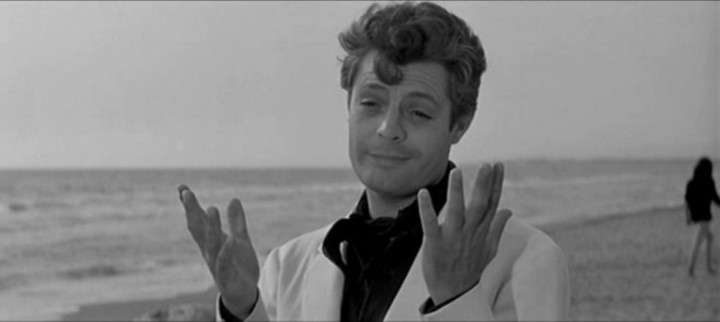
Journalist Marcello (Marcello Mastroianni) lives in Rome, reporting on the social scene and dallying with the wealthy and powerful in nightclubs. He is engaged to Emma (Yvonne Furneaux), who has taken to drug dependency to keep Marcello focused on her, while Marcello engages in one-night stands with a variety of women. One woman, Maddalena (Anouk Aimee), a wealthy heiress, is tired of Rome and it’s paparazzo filled streets, while visiting Swedish actress Sylvia (Anita Ekberg) – a free spirit who seems to lack even the most basic propriety, while her boyfriend Robert (Lex Barker) – enchants Marcello as someone who has everything he wants; namely, the freedom to live the life he can only dream of. Marcello also encounters Steiner (Alain Cuny), a man whose tragic path through life will have a profound impact on the journalist.
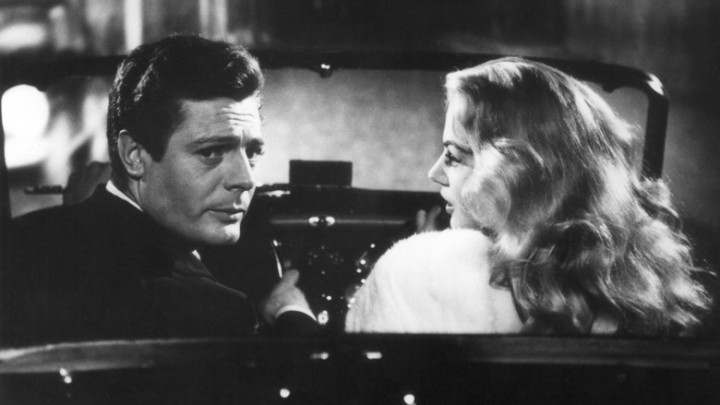
La Dolce Vita is a film I struggled with. I suspect I’ll probably struggle with it as I continue to re-watch it throughout my life. The film lacks a traditional cause-and-effect narrative, skipping across a variety of events throughout Marcello’s encounters with the characters in the film, and I found myself confused a lot of the time by what was supposed to be happening, and when. Since I’m no expert in subtext, and found myself wondering about a lot of the underlying messages in what I presume is some kind of social allegory – or as is, according to a variety of websites I researched prior to writing this review, a religious one – this is a film that requires more than just a casual viewing. Much of the film’s dialogue (at least in the subtitled version I watched) seems simplistic and almost discordantly melodramatic, almost theatrical rather than realistic, which took some getting used to considering a lot of the action and story seems to be set realistically by Fellini’s meandering screenplay. The film plays more a series of events, rather than a cohesive whole, and although initially hard to get my head around, eventually I just took it as it was, and accepted it.
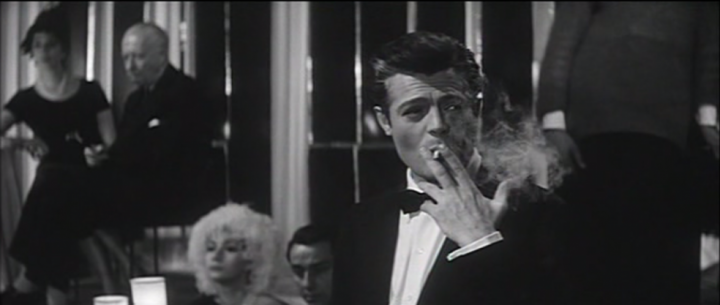
La Dolce Vita’s central character, Marcello, comes off initially as a bit of a dick, sleeping around on his obviously dependent fiancee, searching for something, or someone, to “fulfill” him in what he apparently sees as a boring, rote career in journalism. Not that Marcello makes a great journalist: he rarely seems to take notes, never picks up a camera, and lacks structure within his life other than a careening lurching from one dalliance to another. As the film progresses, however, I warmed to Marcello, not through his actions but through his increasingly puzzled reactions to those around him. Marcello is stuck between two worlds: the world he lives in, and the world he wants to live in. Marcello isn’t an antagonist who provokes action, rather he simply responds to action around him – with one exception, a final, charged sequence involving a striptease at a party, which is instigated by Marcello – and although this lack of propulsion on Marcello’s behalf might stall the story, it actually allows others around him to blossom into their roles. Yvonne Furneaux, as Marcello’s poor fiancee Emma, is heartbreaking, subjected to what must be years of infidelity and yet herself remaining faithful. Her prayer to God during a sequence with a sighting of the Madonna (which is a hysterical sequence on its own), where she asks for Marcello’s heart to be true to her, sets her character as the film’s key female tragedy.
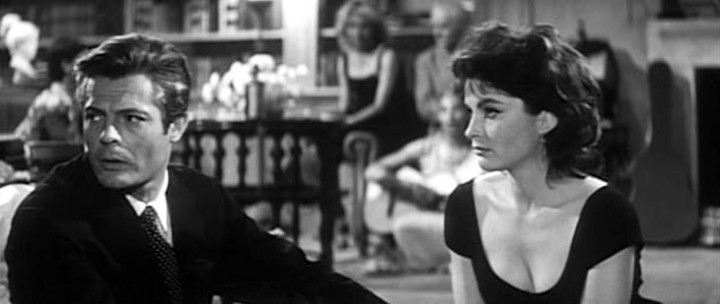
Anita Ekberg, as Sylvia, positively glows throughout her performance. She’s sexy, sensual and very much set up as a Marilyn Monroe type figure, unattainable and unreachable for the “common” man, and yet something most men keep trying to attain. Ekberg’s radiance is never more potent than her opening jumble through the streets of a nighttime Rome, ending in a frustrating finale in the Trevi Fountain. The third of the primary women in Marcello’s life, Maddalena, is played by Anouk Aimee (isn’t Anouk such a delightfully tongue-friendly name?) who brings a more glamorously rigid flavor to the story, even if she wanders in and out of the narrative almost at random. Then there’s Paola (Valeria Ciangottini), a young girl Marcello meets at a cafe, who seems more life-like and radiant than any of the pretenders he’s met so far – Fellini seems to give her an impish fearlessness, almost as a muse of sorts for Marcello to gather his thoughts (even though he can’t write a word at the cafe, thanks to the constant distractions). La Dolce Vita seems to revolve around the women in the film, rather than Marcello, even though he’s front and center for the majority. It’s something I found effective, although at times frustrating in that I wanted Marcello to develop through his own actions, rather than responding simply to the actions of those around him.
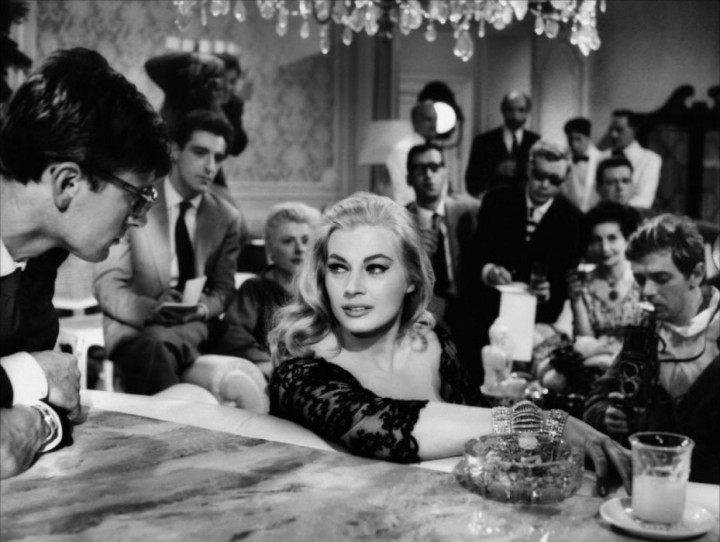
Although I didn’t take a lot out of the film on first watch, I did find it amusing that La Dolce Vita paints the local photographers of Italy – people we now call paparazzi – as almost rat-like, clambering over each other to get “the shot” or “the look” they need to sell papers. La Dolce Vita makes a point of their intrusion almost constantly, as if reminding us that modernism, against the classic era of civility and restrained lifestyle, is slowly becoming the “at any costs” scrabble for attention is it now. Otherwise, I’m not sure what point the constant paparazzo appearances makes other than to be the comedic element to the movie when surrounded by emotional tragedy and angst.
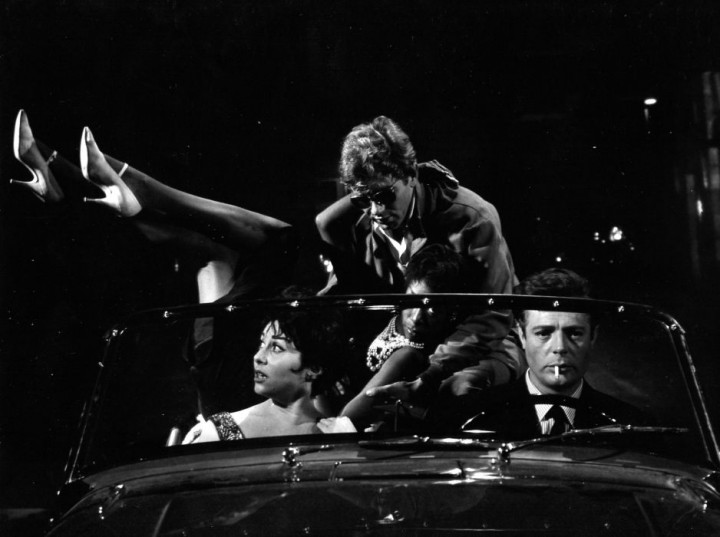
As a fan of discovering the technical aspects of film, I found La Dolce Vita a beautiful film to watch, in terms of it’s visual proficiency. The film is shot in glorious black and white, framed in the now classic scope aspect, and Fellini’s eye is rock solid on capturing exactly what he needs to. He uses the frame well, as well as some dynamic camera-movements – pans, tracking and dolly shots – that made me think of some of the Dario Argento movies I’ve seen. Fellini has a little more restraint that Argento’s more gregarious style, but it’s easy to see the influence Fellini must have had on his countryman. The way the film is lit, by legendary cinematographer Otello Martelli, and the use of soft, deep, anamorphic focus, is wonderful, giving the film an almost fairy-tale feel layered across its more serious dramatic undertones. Appreciating the technical aspects of the film – which won an Oscar for costume design – is easy enough, and admiring Fellini’s mastery of his art is an enduring love affair in and of itself, yet where I faltered is the story.
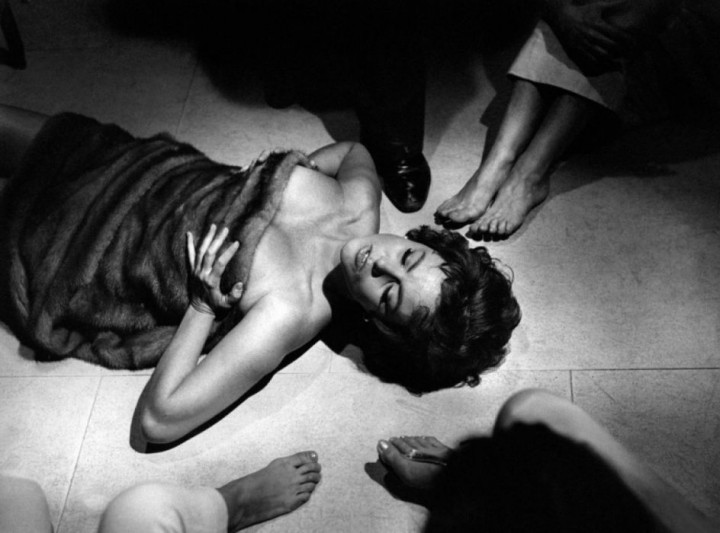
The story just felt too bereft of focus, too extraneous to really grab hold of me. The characters are interesting to a point, and Marcello develops nicely as the film progresses, but the disparate tones throughout each subplot seems too jarring to give the film an overall feeling of belonging to the same film. I really struggled to understand what I was supposed to learn or take from Marcello’s story, other than that being a dick and a lothario invariably ends up making one lonelier than what one started out as being. The mix of wry humor (Marcello’s scenes with his father, brought a smile to my face) and outright tragedy (Steiner’s gut-wrenching concluding arc stands out) didn’t work for me, although I suspect a few more viewings to fully appreciate this delicate marinade might allow better understanding. That’s not a flaw in the film as much as a personal indictment, really. I thought the film was entertaining, sure, and has plenty of subtext and hidden messages for more intellectual folks than I to elucidate, but I didn’t appreciate it as the classic it is now considered to be. I feel as though I’m missing something, and that annoys me. What is it that everyone sees about this film that I don’t?
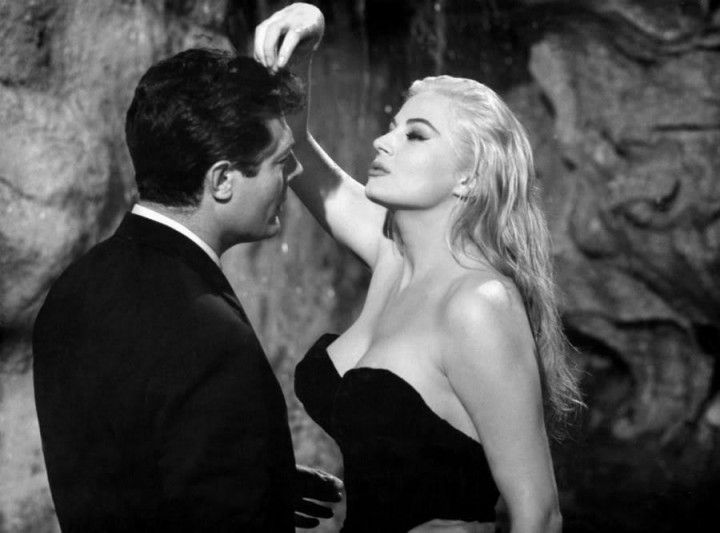
La Dolce Vita didn’t quite reveal its heart to me, as much as I tried to let it. The characters didn’t feel real, although the cast do a top job delivering their roles in this vaguely tragi-comic style Fellini employs, and the script seems to meander without a clear sense of purpose (which is probably the point, upon reflection, showing us just how emotionally rudderless these people really are), leaving La Dolce Vita more a vagary than a definitive example of Fellini’s oeuvre. I enjoyed it, but I struggled with it.


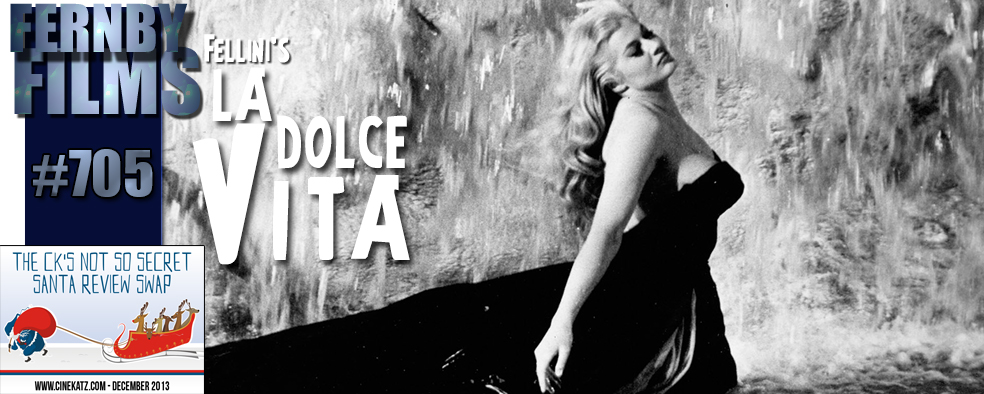


 6 Great Italian Movies You Should Watch
6 Great Italian Movies You Should Watch Federico Fellini: 5 Reasons He Still Matters
Federico Fellini: 5 Reasons He Still Matters




Women of the past used to be so damn sexy… Yes, I'm staring at the boobs. In fasat as i Tpye the rest of this im not even alookin at the keyboard.
Thanks for participating, Rodney!
My recent post The 2nd Annual Golden Katz Awards: Vote Now
It's not even like they're trying to hide them, innit? Lol!
Another great review, Rodney! I don't think I could love Federico Fellini's work more and this is definitely a film that needs multiple viewings. Have you seen "8 1/2" by chance?
My recent post Katz Korner: How Did You Watch Most of Your Movies in 2013?
No, I haven't yet, but it's on my (evergrowing) list of ones to catch up on. I think I'll be taking Fellini slowly, though. Seems his films should be appraoched like an expensive bottle of wine – savored, with relish, and not often.
I'm in the same situation, familiar with the reputation but bereft of the experience. You did a nice job summarizing your reaction to the film. I'm more encouraged now to make an effort.
This is the kind of film where I feel utterly inadequate as both a film lover and a blogger – I lack the intellectual ability to grasp the more subtextual elements of the film, and I lack the skill with English to give voice to why I did or did not "get" it. Good luck with your watching of this one, Richard!
Thanks for linking my review 🙂
My recent post Mini-Review: Electric Dreams (1984) is the Definition of Cheesy 80s Cinema
You're most welcome, David.
Very solid impressions, sir! This IS a film you can't watch once, so give it a few more viewings and things will click into place (well, the things that matter). I'll recommend Nights of Cabiria or La Strada next as they're more narrative and character driven and star the wonderful Giulietta Masina in two of her best roles. I think you'll like them a lot.
My recent post Back Up And On My Feet. Or Perhaps I’m Dreaming Again…
Thanks geelw, I'll most definitely be checking out other Fellini films in the future, and I'll take your recommendations under advisement! Thanks for popping in!